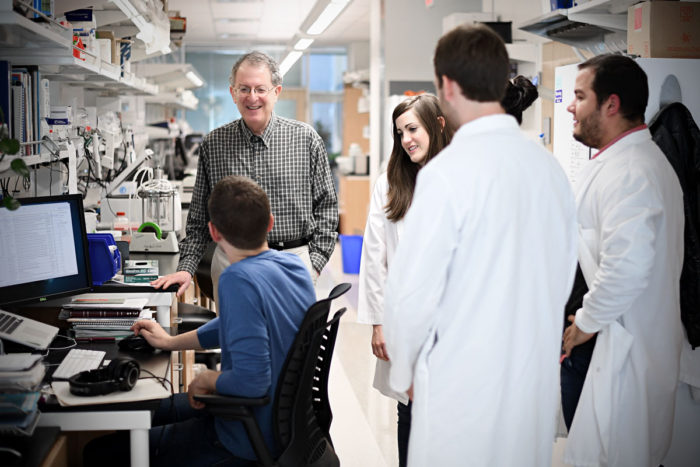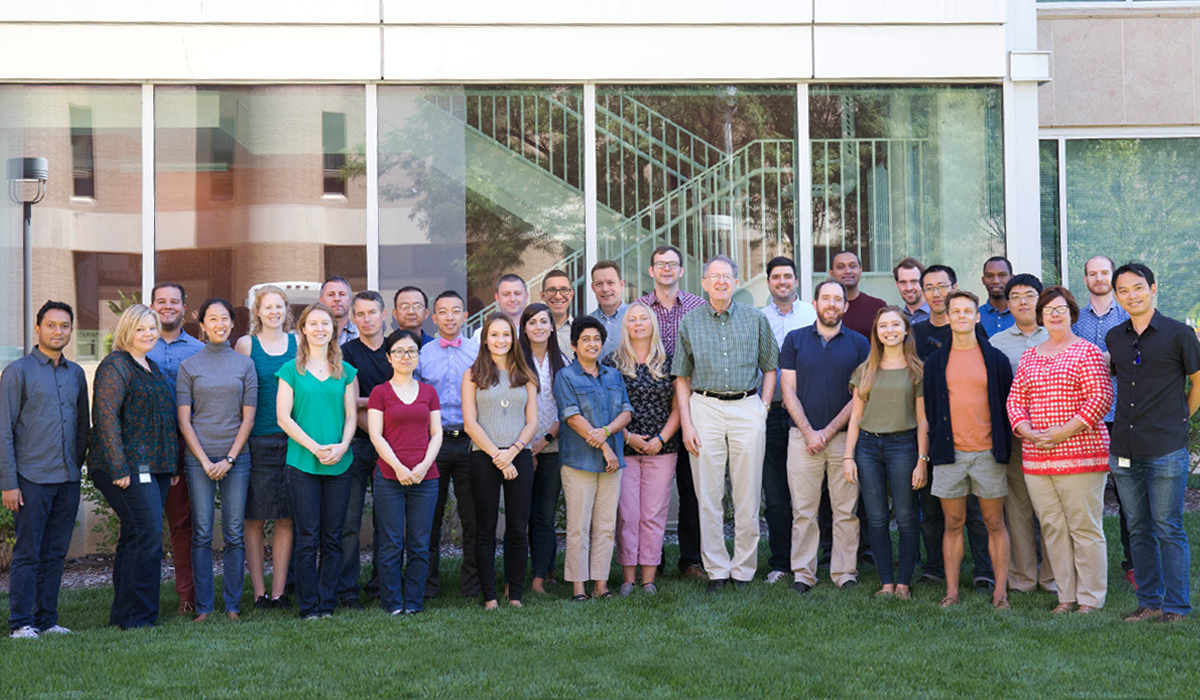Gordon recipient of Massry Prize
Three scientists honored for revealing roles of microbes in human health, disease
 James Byard
James ByardJeffrey I. Gordon, MD, (left) speaks with members of his lab in the Edison Family Center for Genome Sciences and Systems Biology. Gordon is a recipient of this year's Massry Prize for his body of research demonstrating the importance of the gut microbiome in human health and disease.
Jeffrey I. Gordon, MD, of Washington University School of Medicine in St. Louis, will share the 2017 Massry Prize with fellow microbiome researchers Norman Pace, PhD, of the University of Colorado Boulder, and Rob Knight, PhD, of the University of California San Diego.
Gordon is the Dr. Robert J. Glaser Distinguished University Professor and directs the Edison Family Center for Genome Sciences and Systems Biology at the School of Medicine. He is internationally known for his pioneering research revealing the vital roles played by gut microbial communities in human health and disease.
Over the past 20 years, Gordon’s interdisciplinary work has provided fundamental insight into how members of the human gut’s vast community of microbes interact with one another and influence the host. He has done so by combining innovative studies of humans, including twins, with innovative animal models. The work has linked alterations in the gut microbiota to two pressing global health problems: obesity and childhood malnutrition.
“It’s an honor and a privilege to receive this year’s Massry Prize together with my colleagues,” Gordon said. “This award also recognizes the work of the inspiring and talented group of doctoral students, postdoctoral fellows, staff and collaborators I have had the privilege and pleasure of working with over the years.”
Gordon has served as a mentor to more than 125 graduate students and postdoctoral fellows since his lab was established at Washington University. Many have gone on to become leaders in the microbiome field and describe their time in his lab as transformative.
“When I started in Jeff’s lab, the term ‘microbiome’ didn’t exist,” said Lora V. Hooper, PhD, the Jonathan W. Uhr, MD, Distinguished Chair in Immunology at the University of Texas Southwestern Medical Center and a member of the National Academy of Sciences. “I feel fortunate to have had the opportunity to come in on the ground floor of this field. Microbiology used to be solely focused on disease-causing bacteria, and work in Jeff’s lab really showed that we should be paying attention to whole microbial communities. His studies led to a fundamental shift in understanding these organisms, showing that gut microbial communities are important in normal physiology and development. He’s also an amazing mentor, very generous in letting people choose what they want to study and steering them toward areas that mesh with their personalities and talents.”
Former postdoctoral fellow Fredrik Bäckhed, PhD, director of the Wallenberg Laboratory for Cardiovascular and Metabolic Research and the Torsten Soderberg Professor in Medicine at the University of Gothenburg, Sweden, echoed Hooper’s sentiments.
“Jeff was great in recruiting individuals with complementary skills and creating an ambitious and exciting atmosphere without internal competition,” Bäckhed said. “These were truly the most fascinating and fun years of my career. We had the opportunity to wholeheartedly focus on the science and be a part of developing the microbiome research field. He also provided excellent training for setting up our own research groups and is still an excellent mentor and source of inspiration to me.”
Gordon’s work epitomizes the union of basic and clinical science. For example, he and his students discovered that gut microbial communities from children suffering from malnutrition fail to develop properly, leaving such children with immature gut microbial “organs.” The researchers subsequently used mice colonized with microbiota from healthy and malnourished children to provide preclinical proof of concept that this impaired community development causally was related to growth faltering. They went on to develop microbiota-directed therapeutic foods designed to repair microbiota immaturity. Gordon and his colleagues at the International Centre for Diarrhoeal Disease Research in Bangladesh have since begun a clinical trial to test this new therapeutic approach for repairing the gut microbiota and restoring healthy growth in malnourished children.
The Meira and Shaul G. Massry Foundation established the Massry Prize in 1996 to recognize outstanding contributions to the biomedical sciences and the advancement of health. The Massry Prize Lectures, which the winners give every year, are held on the campuses of the University of Southern California and the University of California Los Angeles. This year’s lectures will be held Oct. 5.
 Courtesy of Jeffrey I. Gordon
Courtesy of Jeffrey I. Gordon





